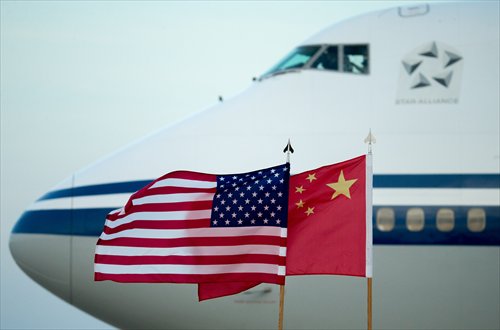Xi to outline nuclear policy
China, US should seek security common ground: analysts

The plane carrying Chinese President Xi Jinping arrives at Andrews Air Force Base, Maryland on Wednesday. Xi is in Washington, DC to attend the Nuclear Security Summit. Photo: AP
Despite rising tensions in the South China Sea and disagreement over North Korea, the two-day Nuclear Security Summit (NSS) in Washington, DC may eventually remind China and the US that the two largest economies of the world still have more common ground, analysts said.
Chinese President Xi Jinping, who arrived on Wednesday for the summit that started on Thursday, is scheduled to meet with US President Barack Obama on the sidelines on Thursday afternoon. The two leaders are expected to discuss a range of issues, including the South China Sea tensions and the North Korean nuclear threat.
Relations between the two countries have sunk over the past few years after sparring over a series of issues including maritime disputes, cyber security and North Korea. But the two-day nuclear summit will show that the two nations have more common interests in global governance, such as fighting the rising threat of nuclear terrorism and boosting global nuclear security cooperation.
Obama inaugurated the NSS in 2010 after speaking in Prague in 2009, with ridding the world of nuclear weapons as a central theme of his presidency. Chinese presidents have attended all four summits since 2010.
"The NSS is a flagship program of Obama. Obama wants to carry things through with his policy. China, too, wishes to carry things through in cooperation with the US," Zhang Jiadong, a professor at Fudan University, told the Global Times.
China's proposals
During the summit, Xi is scheduled to address the opening plenary session on Friday to discuss China's nuclear security policy, present China's new measures and achievements in the area and offer practical proposals on further beefing up global nuclear security.
In the previous NSS meeting in The Hague in 2014, Xi outlined China's nuclear strategy as placing "equal emphasis" on nuclear development and safety.
"Xi is likely to continue stressing this stance at the 2016 NSS, calling for protection of developing countries' right to nuclear power for civilian purposes," Huang Rihan, a researcher at the Center For China And Globalization, a think tank, told the Global Times.
Huang said China's nuclear technology has advanced over the years and through the NSS, Xi may wish to demonstrate China's willingness to provide more products in the field of civil nuclear power.
Defeating IS
This year's summit will also devote a special session to coordinating efforts to defeat the Islamic State.
The summit comes a week after a series of explosions struck Brussels' airport and metro, killing 32 people and injuring over 300 others.
On top of the deadly attacks, fears of nuclear terrorism loom as Belgian newspaper La Derniere Heure reported that the Brussels bombers were planning to attack a nuclear power plant, with police seizing 10 hours of surveillance footage of Belgium's nuclear power chief.
"[The planned attacks] show that nuclear terrorism has become a tangible threat that needs to be addressed at this summit," Wang Yinan, a researcher at the Development Research Center of the State Council, told the Global Times.
The summit is also expected to discuss more conventional topics, such as combating nuclear smuggling and reducing the amount of highly enriched uranium, according to Fan Jishe, a scholar at the Chinese Academy of Social Sciences.
The Chinese president will also take part in a leaders' meeting on the Iranian nuclear issue under a framework commonly known as P5+1, which comprises the five permanent members of the UN Security Council - Britain, China, France, Russia and the US - plus Germany.
Russian President Vladimir Putin did not attend this year's summit.
Kremlin spokesman Dmitry Peskov said on Wednesday Russia was skipping the summit because of a "shortage of mutual cooperation" in working out the agenda.
Agencies contributed to this story
Full text: National Progress Report on Nuclear Security of the People's Republic of China
Full text: China-U.S. Joint Presidential Statement on Climate Change